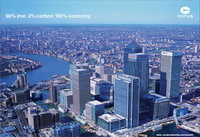Global economy goes through period of uncertainty
The global economy exists in a period of uncertainty now, with risks to continued growth much higher than they were six months ago.

Spain's Rodrigo de Rato said recent turbulence in credit markets, the worst in a decade, is a warning that the continually expanding global economy of recent years cannot be taken for granted.
"We still do not know the full extent of the decline in the house market and the subprime problems of the U.S. economy," he said, referring to risky mortgages made to borrowers in the U.S. with spotty credit or low income.
He said further disruption in financial markets and further falls in housing prices could lead to a global economic downturn, making other risks - rising food and oil prices, a falling dollar - loom larger.
As a result of the turbulence, he said the IMF expects "a slowdown in growth but not a recession in the United States, and a smaller slowdown in other advanced economies."
De Rato spoke at the closing meetings of the IMF and its sister institution, the World Bank. It was his last address to the group; he is stepping down as the head of the 185-nation lending organization after 3 1/2 years. His successor, France's Dominique Strauss-Kahn, takes over Nov. 1.
Groups demonstrating against global warming and war snarled traffic Monday around the U.S. Congress, leading to dozens of arrests.
The protests were part of a series of demonstrations that have taken place in Washington since Friday, the first day of the annual meetings of the World Bank and the IMF. Most of the protests have been peaceful.
Monday's demonstrations, which involved several hundred people, were part of a "No Warming, No War" protest, which combined an environmental agenda with an anti-war stand.
De Rato said that, so far, movements in currency exchange rates have been orderly, "but there are risks that an abrupt fall in the dollar could either by triggered by, or itself trigger, a loss of confidence in dollar assets.
"And there is a risk that exchange rate appreciation in countries with flexible exchange rates - including the euro area - could hurt their prospects, and that, in these circumstances, protectionist pressures could worsen."
He said over the past few months the world has lived through an earthquake in credit markets.
"Like most earthquakes, it has been something distant for most people, something they read about in the newspapers. But there is still a risk of aftershocks, and the full effects of the disruption we have already had will only be felt over time."
He told his audience of finance ministers and central bankers that, along with the IMF, they need to consider what actions to take to limit the damage and what lessons can be learned from the crisis.
Speaking for the host country, U.S. Treasury Secretary Henry Paulson said innovations in financial markets over the past five years have made them more complex.
"We need to continue to be vigilant because all of our capital markets are not functioning normally. As we move to address current problems, we must also address policy issues to prevent a repeat of recent excesses."
Addressing his first plenary session of the two institutions, World Bank President Robert Zoellick said the bank had to stretch itself to become more relevant to the poor and middle income countries it tries to help.
Zoellick, a former U.S. diplomat, trade representative and investment banker who took over July 1., said the bank's main priorities would be combatting poverty, helping countries emerging from civil strife, promoting regional cooperation to combat disease and climate change, aiding the Arab World and providing technical assistance.
"There is a great need - and a compelling opportunity - for the World Bank group at this point in history," he said.
The IMF-World Bank meetings took place against a backdrop of soaring oil prices, a falling dollar and the worst credit crisis in a decade, brought when markets essentially froze.
The Group of 24 developing countries noted wryly in their communique that, for once, a financial crises began in one of the advanced nations instead of in Asia or Latin America, as has happened in the past.
Subscribe to Pravda.Ru Telegram channel, Facebook, RSS!


